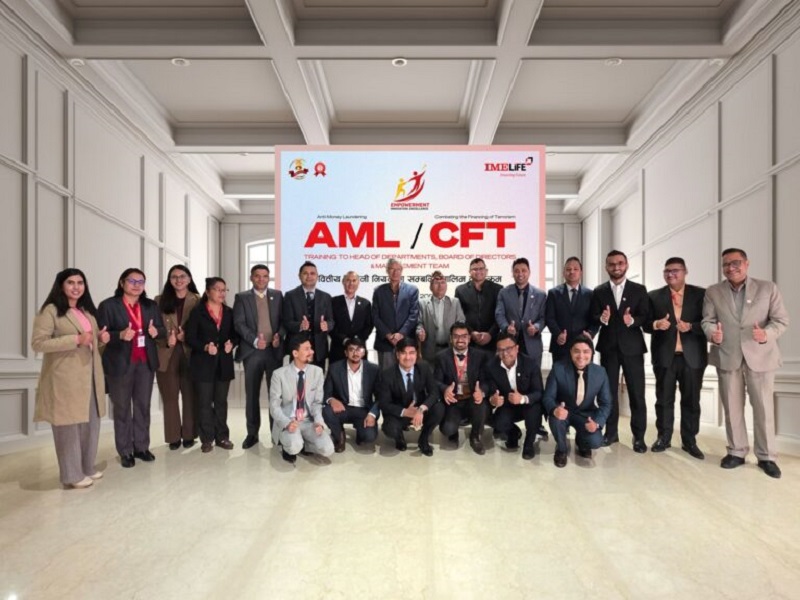IME Life Insurance Conducts AML–CFT Training for Management and Department Heads
25th November 2025, Kathmandu
IME Life Insurance has demonstrated its proactive stance on corporate compliance by organizing a dedicated training program on Anti-Money Laundering (AML) and Countering the Financing of Terrorism (CFT).
IME Life AML–CFT Training
This essential training was specifically conducted for the company’s board members, management, and departmental heads to ensure top-down adherence to regulatory and legal requirements.
Key Areas of Training and Compliance Focus
The training program focused on providing comprehensive insights into the legal obligations and best practices necessary to protect the insurance sector from being exploited for illicit financial activities, including the financing of proliferation of weapons of mass destruction.
Regulatory Updates: Experts detailed the existing laws, regulations, and the latest guidelines issued by regulatory authorities. For insurance companies in Nepal, this compliance framework is primarily governed by the Money Laundering Prevention Act, 2064 (2008), and directives issued by the Nepal Insurance Authority (formerly Insurance Board) and the Financial Information Unit (FIU) of Nepal Rastra Bank.
Legal Provisions: The training highlighted specific legal provisions that target the prevention of:
Money Laundering (ML): The process of disguising the origins of illegally obtained money so that it appears to have originated from a legitimate source.
Financing of Terrorism (FT): The provision of funds for terrorist acts or organizations, often involving small amounts that are difficult to track.
Proliferation Financing (PF): The provision of funds or financial services to non-state actors for the manufacture, acquisition, or transport of weapons of mass destruction.
Best Practices and Controls: Practical sessions covered best practices in risk management, the implementation of effective internal control processes, and the specific responsibilities of insurance companies in maintaining compliance. These practices are rooted in a Risk Based Approach (RBA), which tailors controls (like Customer Due Diligence) to the level of risk posed by the client or transaction.
Management Directives and Corporate Governance
The closing remarks from the company’s leadership stressed the non-negotiable nature of AML-CFT compliance for everyone within the organization.
Shared Responsibility: Board Chair Dr. Ramhari Aryal emphasized that the responsibility for preventing money laundering rests equally upon everyone—from management to department heads and staff. This highlights the concept that AML-CFT compliance is a collective organizational duty, not just a task for the compliance department.
Enhancing Confidence: Dr. Aryal noted that rigorous adherence to relevant legal provisions directly strengthens corporate governance, transparency, and internal control systems. These strengthened internal mechanisms are essential in enhancing customer and investor confidence in the reliability and integrity of IME Life Insurance.
CEO’s Mandate: CEO Pawan Kumar Khadka concluded the training by issuing a direct instruction to all employees to ensure full compliance with AML–CFT regulations. He reiterated the company’s commitment to continuously strengthening its risk management and compliance culture in line with evolving regulatory standards.
The Crucial Role of AML-CFT in Insurance
Insurance companies are designated as Reporting Entities under Nepalese AML-CFT laws because their products, such as high-value life insurance policies, can be misused for money laundering purposes, for example, through the premium payment or surrender process.
Key obligations for insurance companies under the directives include:
Customer Due Diligence (CDD): Implementing Know Your Customer (KYC) procedures to identify and verify the identity of customers and assess their risk profile.
Enhanced Due Diligence (EDD): Applying additional scrutiny for high-risk clients, such as Politically Exposed Persons (PEPs) or those involved in complex, unusual transactions.
Record Keeping: Maintaining records of all transactions, customer identity, and activity logs for a minimum period of five years.
Reporting: Filing Suspicious Transaction Reports (STRs) to the FIU within three days of detection, and potentially filing Threshold Transaction Reports (TTRs) for transactions exceeding a specified monetary limit, though some transactions like premium payments may be exempted from TTR.
The training program organized by IME Life Insurance demonstrates a proactive approach to legal compliance and risk mitigation, ultimately fostering a robust culture of integrity across the entire organization, which is essential for the stability of the financial system.
For More: IME Life AML–CFT Training







